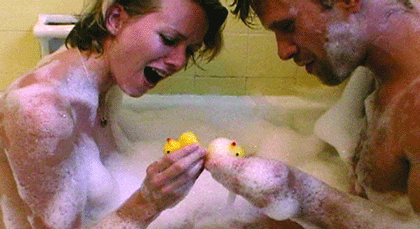Naomi Watt vehicle challenges her range, but lacks a plot to care about
Gay writer, producer, and actor Scott Coffey’s film “Ellie Parker” originated as a short back in 2001. The 16-minute film starred Naomi Watts as an anxious, insecure actress shuttling back and forth from one audition to another. Ellie starts out as a Southern belle, and then transforms—applying makeup, and changing clothes while driving her Honda—into a Brooklyn whore. Watts is fantastic in this entire sequence, and she proves herself to be a very resourceful actress here.
However, after this sequence, when the plot of “Ellie Parker” kicks in, the film stumbles, never quite making the character interesting when she’s not “acting.” At one point as Ellie waits for her big break to come, she moans to her therapist, “I don’t know who I am!”
Over the course of the film, audiences don’t get much of a sense of who she is, either. Watts tries hard to make a sequence of her buying and eating ice cream interesting, but a trip to the zoo to study the animals—for her acting class, it turns out—is ineffective. There are many such extended sequences, and few of them illuminating.
Alas, much like the dreadful Lisa Kudrow sitcom “The Comeback,” “Ellie Parker” becomes painful—and rarely amusing—to watch, as its heroine suffer a series of humiliations. Ellie’s boyfriend Justin (Mark Pellegrino) is a loser guitarist who cheats on her. She meets Chris (Coffey), a guy who rear ends her car, and then begins a deceitful relationship with her. Her best friend Sam (Rebecca Rigg) offers support, but she too, is also competing with her for auditions and not always reliable. Ellie is afraid of being alone, but she is also hard to spend time with.
“Ellie Parker” is best when it satirizes the whole Hollywood industry—the doubletalk of casting agents and producers, or auditioning for lousy TV shows. Sam’s monologue about the role of a former Playmate turned sharpshooter cop on a Fox series is a highlight. Yet while Coffey obviously understand the horrible process of auditioning, his film is perhaps too insider to be funny to non-actors.
Despite Watts’ compelling performance, “Ellie Parker” can’t help being anything more than an extended vanity production. To wit, Coffey had his boyfriend Blair Mastbaum co-produce the film (with Watts), appear in a bit role, and serve as the cinematographer.
And the filmmaker seems to have called in favors from folks such as Keanu Reeves, who appears with his band Dogstar, and Chevy Chase, who plays Ellie’s manager, Dennis. These cameos are fascinating more for the chance of watching Reeves play himself, and Chase, goateed, take on a semi-serious role, but they serve as little more than distractions from the film’s minimalist plot.
In fact, “Ellie Parker” is too thinly plotted. As Ellie waits for a callback for one of her auditions she begins to question whether or not to pursue an acting career. But Ellie is too mercurial a character for audiences to care about her getting a job, or dropping out of the business. The same is true about her personal life. Her relationships with Justin and Chris—neither of whom is an especially likable man—are as unsatisfying for the audience as they are for her.
The film also contains a fair share of heavy-handed moments, such as one in which Ellie is caught by her therapist, no less, as she is standing in a trashcan full of her headshots and videotapes. The symbolism is painfully unsubtle.
And while Coffey insists on shooting the film in digital video—lending an air of immediacy to Ellie’s emotional rollercoaster and various crises—the camerawork is often annoying, shot intensely, and as often as possible in close-up. A scene of Ellie looking at herself in her car’s side mirror is revealing until Coffey zooms in conspicuously and ruins the moment.
Nevertheless, Watts does manage many impressive moments. She shows considerable range, and the character does allow her to stretch as an actress. Too bad the film is not as good as her performance.
The worst thing about “Ellie Parker” is its tediousness. When Ellie complains, “I feel like I’m waiting for my life to start,” some viewers might respond, “I feel like I’m waiting for this film to end.”
gaycitynews.com


































